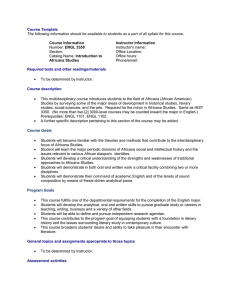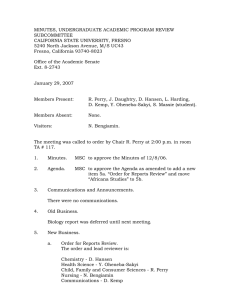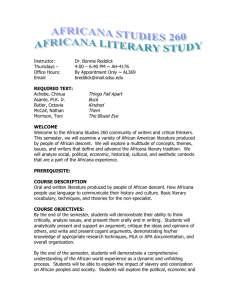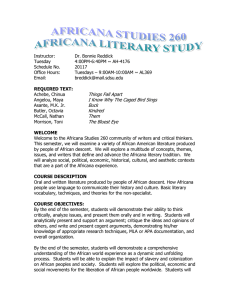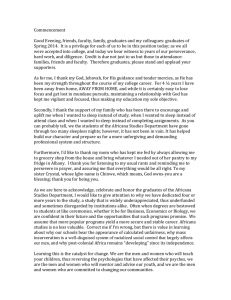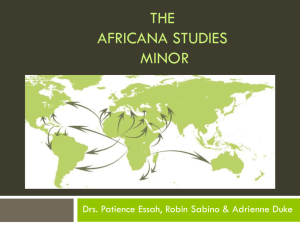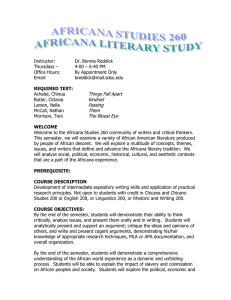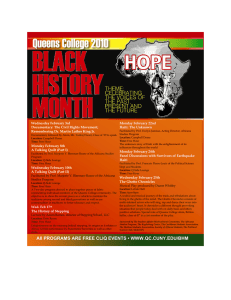– INTRODUCTION TO AFRICANA STUDIES AFRICANA STUDIES 101A Instructor:
advertisement
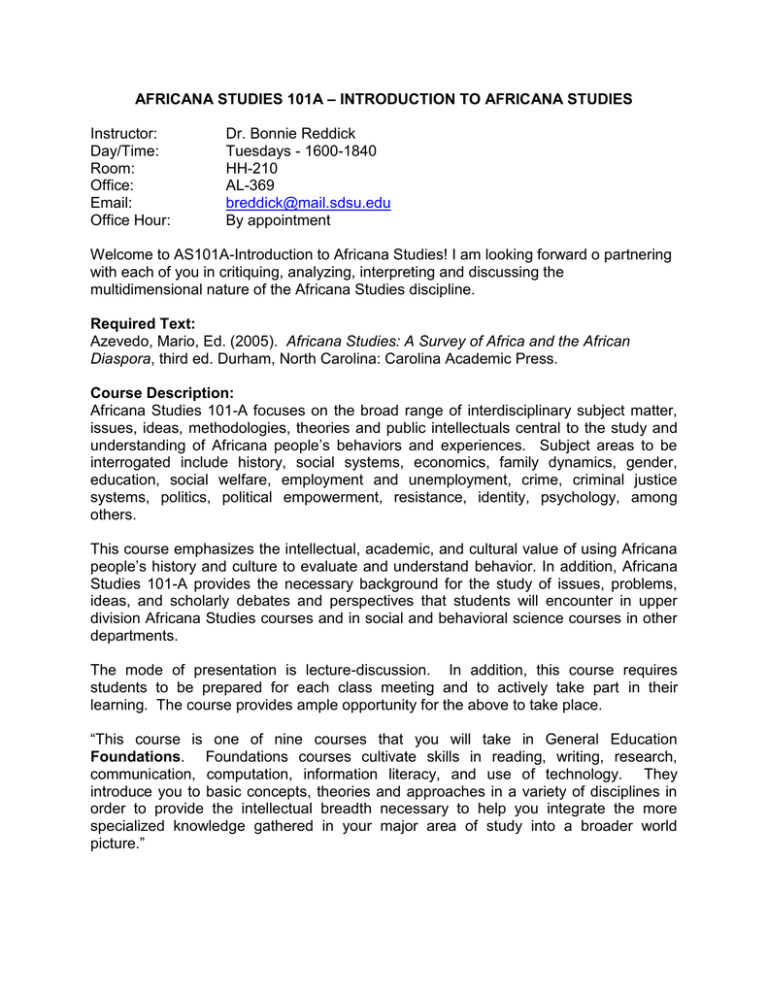
AFRICANA STUDIES 101A – INTRODUCTION TO AFRICANA STUDIES Instructor: Day/Time: Room: Office: Email: Office Hour: Dr. Bonnie Reddick Tuesdays - 1600-1840 HH-210 AL-369 breddick@mail.sdsu.edu By appointment Welcome to AS101A-Introduction to Africana Studies! I am looking forward o partnering with each of you in critiquing, analyzing, interpreting and discussing the multidimensional nature of the Africana Studies discipline. Required Text: Azevedo, Mario, Ed. (2005). Africana Studies: A Survey of Africa and the African Diaspora, third ed. Durham, North Carolina: Carolina Academic Press. Course Description: Africana Studies 101-A focuses on the broad range of interdisciplinary subject matter, issues, ideas, methodologies, theories and public intellectuals central to the study and understanding of Africana people’s behaviors and experiences. Subject areas to be interrogated include history, social systems, economics, family dynamics, gender, education, social welfare, employment and unemployment, crime, criminal justice systems, politics, political empowerment, resistance, identity, psychology, among others. This course emphasizes the intellectual, academic, and cultural value of using Africana people’s history and culture to evaluate and understand behavior. In addition, Africana Studies 101-A provides the necessary background for the study of issues, problems, ideas, and scholarly debates and perspectives that students will encounter in upper division Africana Studies courses and in social and behavioral science courses in other departments. The mode of presentation is lecture-discussion. In addition, this course requires students to be prepared for each class meeting and to actively take part in their learning. The course provides ample opportunity for the above to take place. “This course is one of nine courses that you will take in General Education Foundations. Foundations courses cultivate skills in reading, writing, research, communication, computation, information literacy, and use of technology. They introduce you to basic concepts, theories and approaches in a variety of disciplines in order to provide the intellectual breadth necessary to help you integrate the more specialized knowledge gathered in your major area of study into a broader world picture.” Catalog Description: Interdisciplinary introduction of African American thought and behavior. Subject areas include social systems, economic empowerment, self development, family dynamics, use of power, cognitive styles, interethnic communication and international relations. Review of relevant literature in social and behavioral sciences. Course Goals and Objectives: 1. Define and use major Africana Studies vocabulary 2. Identify major intellectuals and their contributions to Africana Studies 3. Trace the development and evolution of the discipline 4. Identify, use, and analyze major themes, issues, and concerns of Africana people 5. Identify, use, and analyze major theories and methodologies of the discipline 6. Identify key features of an Africana response to living in the world through an Africana worldview 7. Identify and discuss Africana people’s history and culture 8. Identify and discuss Africana people’s politics and political empowerment strategies 9. Write an essay that is coherent and organized; appropriately research and cited, using conventional rhetorical strategies indicative of college-level writing 10. Articulate cogent ideas 11. Successfully pass various assessments Grading Criteria Weekly Quiz Activities: African Museum Bayview Baptist Sunday morning Worship Map of Africa Research Project Midterm Final Attendance/Participation TOTAL 10% 15% 20% 25% 25% 5% 100% A (95-100); A- (90-94); B+ (86-89); B (83-85); B- (80-82); C+ (76-79); C (73-75); C- (70-72); D+ (66-69); D (63-65); D- (60-62); F (0-59) READING Reading is an important part of developing strong writing and critical thinking skills. Completion of all readings will be necessary for quizzes, homework, essays, and class discussions and should be completed before each class. WEEKLY QUIZ There may be a quiz for each reading assignment before each class. Quizzes may contain True/False, multiple choice, short fill-ins. ACTIVITIES African Museum Each of you must visit the African Museum “Casa de Rey Morro”, located in Old Town at 2471 Congress Avenue. It’s open from 10:30AM to 7:00 PM daily, EXCEPT on Wednesdays. We will attend as a group on Saturday, SEPTEMBER 26, 2015 at 11AM. Meet me at the entrance. For those who are unable to attend on the class date, you can attend individually, any time before the class date. You must complete the worksheet and turn it in to me. There is an entry fee, of not more than $5. If you do not have the fee, you will not be admitted. For those attending on the scheduled date, I will cover the entry fee. This assignment is mandatory. Write a one-page reflection of your experience, take a “selfie” inside the museum, and include it as page two of your reflection. Submit your reflection to turnitin.com by the due date/time. Bayview Baptist Church Sunday Morning Worship The Black church has played a very important role in the Black community. As a group, we will attend Bayview Baptist Church 9:00 AM service on October 18, 2015. The church is located at 6134 Benson Avenue, San Diego, CA. You must find me before or after service to check in. You must check in with me to receive credit for attendance. This attendance is mandatory. If you do not attend, not only does it count as an absence, you cannot make up the assignment. Write a one-page critique of the service and discuss how your experience aligns with what we discussed in class. Submit your reflection to turnit.com by the Due date/time. If you need a ride to the church, please let me know ASAP. Map of Africa Each student will be required to identify and label particular countries on the African continent. In addition, you will be required to identify and label certain routes and the geographical areas of particular political powers. RESEARCH PROJECT1 During the course of this semester, we will discuss various local, national, or regional African American organizations that are or have been instrumental in the development and continuity of the Africana experience. Each student will be assigned to one of the “Groups” listed below. This is an INDIVIDUAL project. Each student will select an aspect of his or her “group” to do the research project, including answering the following questions: Who – membership/founders; What are its goals/objectives and achievements? What is its significance to the Black community? Where is it located? When was it founded? Is it still active? More specific instructions will be posted on Blackboard. MIDTERM The Midterm may contain True/False, multiple choice, fill-in and short essay questions. FINAL The Final may contain True/False, multiple choice, fill-in and short essay questions. ATTENDANCE/PARTICIPATION Attendance is crucial to your success in this class. I record attendance every day. If you arrive after I have taken attendance, it is your responsibility to come up to me at the end of class and change your absence to a tardy. No absence will be changed after the day you come late. Active participation in class discussions and activities is an essential part of this class. You can do your part by coming to class on time, remaining alert, and being willing to ask questions and share ideas. You should also keep in mind that participating in an inappropriate manner or refusing to participate in class activities will considerably lower your course grade. Many students refrain from commenting during class discussions out of fear that they will give the wrong answer or say something embarrassing. I encourage each of you to risk sharing opinions that you are not entirely sure of. Since none of the readings can be said to have a “perfect” interpretation, your comments can only assist the class in its primary goal of critically exploring the ideas presented in the various texts we will read. TARDINESS/LEAVING EARLY Unless you have made prior arrangements with me, you are expected to be in class on time and remain until class is over. Unexcused incidents of leaving early will be counted as an absence for that day. Arranging with me to arrive late or leave early should be the exception not the rule. Note: Excessive tardies will significantly reduce your course grade. CHEATING/PLAGARISIM “Cheating shall be defined as the act of obtaining or attempting to obtain credit for academic work by the use of dishonest, deceptive, or fraudulent means. Examples of cheating include, but are not limited to (a) copying, in part or in whole, from another’s test or other examination; (b) discussing answers or ideas relating to the answers on a test or other examination without the permission of the instructor; (c) obtaining copies of a test, an examination, or other course material without the permission of the instructor; (d) using notes, cheat sheets, or other devices considered inappropriate under the prescribed testing condition; (e) collaborating with another or others in work to be presented without the permission of the instructor; (f) falsifying records, laboratory work, or other course data; (g) submitting work previously presented in another course, if contrary to the rules of the course; (h) altering or interfering with the grading procedures; (i) plagiarizing, as defined; and (j) knowingly and intentionally assisting another student in any of the above. 2.2 Plagiarism shall be defined as the act of incorporating ideas, words, or specific substance of another, whether purchased, borrowed, or otherwise obtained, and submitting same to the University as one’s own work to fulfill academic requirements without giving credit to the appropriate source. Plagiarism shall include but not be limited to (a) submitting work, either in part or in whole, completed by another; (b) omitting footnotes for ideas, statements, facts, or conclusions that belong to another; (c) omitting quotation marks when quoting directly from another, whether it be a paragraph, sentence, or part thereof; (d) close and lengthy paraphrasing of the writings of another; (e) submitting another person’s artistic works, such as musical compositions, photographs, paintings, drawings, or sculptures; and (f) submitting as one’s own work papers purchased from research companies. Academic and Punitive Sanctions: Cheating and plagiarism in connection with the academic program at The University may warrant two separate and distinct courses of disciplinary action that may be applied concurrently in response to a violation of this policy: (a) academic sanctions, such as grade modifications; and (b) punitive sanctions, such as probation, suspension, or expulsion. Academic sanctions are concerned with the student’s grades and are the responsibility of the instructor involved. Punitive sanctions are concerned with the student’s records and status on campus and shall be the responsibility of the University President or designated representative. The Coordinator of Judiciary Procedures shall be the President’s representative in matters of student discipline.” http:/senate.sdsu.edu/policy/pfacademics.html TURNITIN.COM All assignments should be submitted through Black Board’s turnitin.com by the published due date. By taking this class, each student agrees that all required papers may be subject to submission for textual similarity review to turnitin.com for the detection of plagiarism. All submitted papers will be included as source documents in the Turnitin.com reference database solely for the purpose of detecting plagiarism. You may submit your papers in such a way that no identifying information about you is included. Another option is that you may request, in writing, that your papers not be submitted to Turnitin.com. However, if you choose this option, you will be required to provide documentation to substantiate that the papers are your original work and do not include any plagiarized material. ACCOMMODATION OF DISABILITY If you are a student with a disability and believe you will need accommodations for this class, it is your responsibility to contact Student Disability Services at (619) 594-6473. To avoid any delay in the receipt of your accommodations, you should contact Student Disability Services as soon as possible. Please note that accommodations are not retroactive, and that accommodations based upon disability cannot be provided until you have presented your instructor with an accommodation letter from Student Disability Services. OTHER COURSE POLICIES Treat other students and me with respect. Students are expected to refrain from behavior that interferes with the learning of other students. Come to class prepared. If you are absent, you are still responsible for completing the readings and any homework assigned during your absence. Complete all work on time. Readings and any other assignments are to be completed prior to class. Refer to the course calendar for due dates. Additional assignments are due as directed, when assigned. Late assignments will not be accepted. Except during group work, only one person at a time may address the class. You are expected to listen attentively and refrain from conversation while another person is speaking. No cell phones, pagers, or other electronic equipment may be operated in class. Please do not use text messaging during class. If you use a laptop to take notes, please do not surf the Internet during class. The Course Calendar is tentative and is subject to change.
